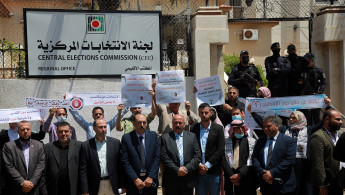Hamas warns against expected postponement of Palestinian elections
The Palestinian Islamist group Hamas has rejected the idea of postponing elections ahead of a leadership meeting on Thursday in which President Mahmoud Abbas's Fatah Party is expected to push for a delay, citing a dispute with Israel over voting in occupied east Jerusalem.
Hamas is expected to perform well in the 22 May parliamentary elections because of increasing divisions within Fatah. Seizing on the sensitive issue of voting in East Jerusalem could offer a pretext for Abbas to call off the first Palestinian elections in 15 years.
On Thursday, a Hamas spokesman told The New Arab's sister channel Al-Araby TV that the movement would not take part in the Palestinian leadership meeting "in order not to provide cover for what might result from it".
Abbas is expected to make a final decision on elections after the meeting on Thursday.
Israel has not said whether it will allow voting in Palestinian East Jerusalem, which it has annexed in violation of international law, but has expressed concern about Hamas's growing strength.
Israel and the US consider Hamas to be a "terrorist" group and are likely to boycott any Palestinian government that includes it.
In a statement issued late Wednesday, Hamas said voting is a "fundamental right of the Palestinian people and this contest has been delayed for a long time".
The statement said that "interfering with this fundamental national right cannot be allowed any circumstances".
Read more: Abbas's Palestinian election theatre
Hamas said voting must take place in East Jerusalem but rejected the idea that it required Israel's permission.
Instead, it called on the leadership to explore ways of "forcing the elections in Jerusalem without the permission of, or coordination with, the occupation".
|
|
It also issued a veiled warning to Abbas without mentioning him by name, saying Hamas "will not be party to any postponement or cancellation and will not provide cover".
The responsibility for any such decision "will rest with those who take it in response to the veto of the occupation", it said.
Israel occupied East Jerusalem, along with the West Bank and Gaza, in the 1967 war, territories the Palestinians want for their future state.
Israel later annexed east Jerusalem in a move not recognised internationally and has allowed hundreds of thousands of settlers to move there in an effort to change the city’s demographic character.
It views the entire city as its capital, barring the Palestinian Authority from operating there. The Palestinians consider East Jerusalem their capital.
According to interim peace agreements reached in the 1990s, some 6,000 Palestinians in East Jerusalem submit their ballots through Israeli post offices. The other 150,000 can vote with or without Israel's permission.
Fatah has said the elections cannot be held without Israel giving express permission for East Jerusalem residents to vote. Its opponents have called for creative solutions, such as setting up ballot boxes in schools or religious sites.
The dispute has taken on greater import since the start of the holy month of Ramadan, when Israel stepped up a campaign of harassment and intimidation against Palestinian Jerusalemites.
Israeli forces tried to prevent the call to prayer being issued from the Al-Aqsa Mosque, Islam's third most holy site and prevented Palestinians from breaking their fast near the mosque.
Last week, Israeli extremists marched through the city under police protection, chanting "Death to Arabs" and attacking and injuring over 100 Palestinians.
The parliamentary elections, and a presidential vote planned for 31 July, offer a rare opportunity for the Palestinians to empower a new leadership and potentially chart a different course in their stalled, decades-long struggle for independence.
The 85-year-old Abbas and his inner circle of Fatah figures, now in their 60s and 70s, have dominated the Palestinian Authority for nearly two decades. They have failed to advance Palestinian hopes for statehood, heal a 13-year internal rift with Hamas, lift the Israeli siege of Gaza or empower a new generation of leaders.
The last elections, held in 2006, saw Hamas win a landslide victory after campaigning as an underdog untainted by corruption. That sparked an internal crisis culminating in Hamas' takeover of the Gaza Strip the following year, which confined Abbas' authority to parts of the Israeli-occupied West Bank.
Hamas' popularity has fallen in the years since, as conditions in Gaza have steadily deteriorated under Israel's crippling blockade. But it has remained unified and disciplined even as Fatah has split into three rival parliamentary lists.
Israel has fought three wars against Hamas in Gaza since 2008, killing thousands of Palestinians in indiscriminate airstrikes.
Agencies contributed to this report.
Follow us on Facebook, Twitter and Instagram to stay connected





 Follow the Middle East's top stories in English at The New Arab on Google News
Follow the Middle East's top stories in English at The New Arab on Google News
![Israeli forces ordered bombed Gaza's Jabalia, ordering residents to leave [Getty]](/sites/default/files/styles/image_330x185/public/2176418030.jpeg?h=a5f2f23a&itok=_YGZaP1z)

